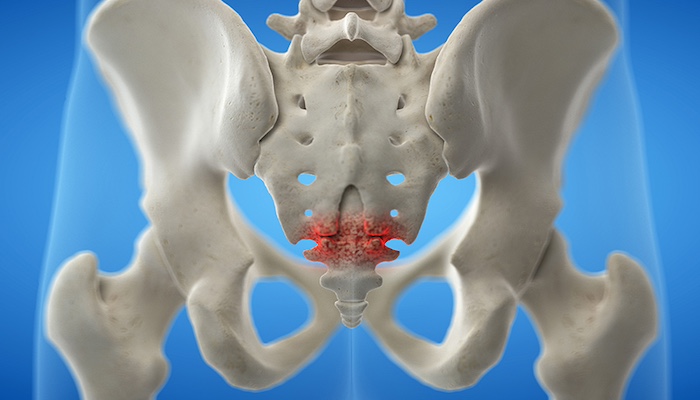
Tailbone pain is usually accompanied by other, more specific symptoms that can sometimes indicate how pain is occurring.
Common Symptoms of Coccydynia
Coccydynia may be further characterized by one or a combination of the following symptoms mentioned below.
Localized pain and tenderness
Pain is generally confined to the tailbone, and does not radiate through the pelvis or to the lower extremities. Pain is usually described as an aching soreness and can range from mild to severe. Tightness or general discomfort around the tailbone may be constant, or pain may come and go with movement or pressure.
Increased pain with sitting
Coccydynia is generally more intense when weight is placed on the tailbone, as in when a person leans backward in a sitting position. Likewise, sitting on hard surfaces without a cushion (such as a wooden bench or a metal folding chair) or leaning back against a wall puts added pressure on the tailbone, causing pain to worsen.
Pain that is worse when moving from sitting to standing
When moving from a seated position to standing or vice versa, the rotation of the pelvic bones (and muscle movements that assist this rotation) may be painful. It may be difficult to stand or sit, requiring one to lean against something to provide better stability.
Pain that may increase with bowel movement or sexual intercourse
Some patients experience heightened pain during sexual intercourse or defecation due to the proximity of the coccyx to the anus and genitals.
Symptoms may differ from patient to patient, depending on one’s unique anatomy and the underlying structures causing pain.
Coccyx pain has the potential to become chronic, lasting longer than 3 months, if the bones’ structural instability persists the surrounding muscles and ligaments continue to be strained, and/or if there is local inflammation.
Precision Pain Care and Rehabilitation has two convenient locations in Richmond Hill – Queens, and New Hyde Park – Long Island. Call the Queens office at (718) 215-1888 or (516) 419-4480 for the Long Island office to arrange an appointment with our Interventional Pain Management Specialists, Dr. Jeffrey Chacko or Dr. Sonny Ahluwalia.













